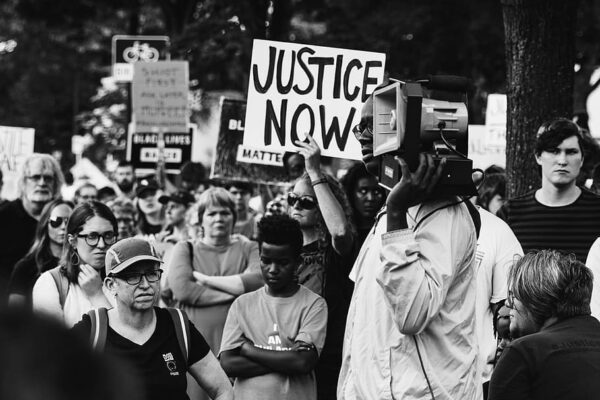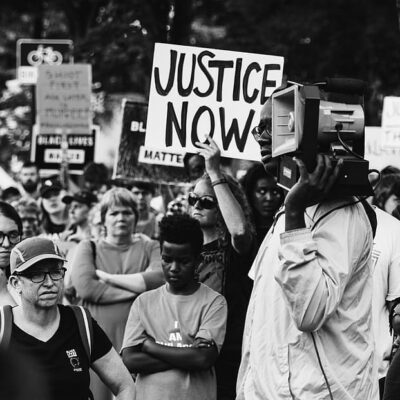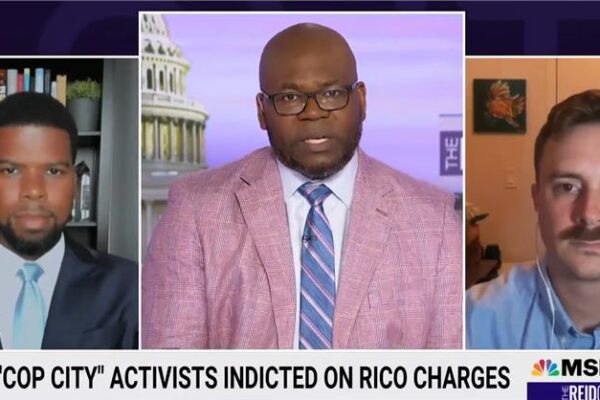One of my favorite movies is No Country for Old Men. Late in the film, one of the main characters, Ed Tom, is looking to an older family member for advice on how to deal with a world he finds increasingly difficult to understand and is told curtly: “What you’ve got ain’t nothing new…this country’s hard on people,” and that quote for one reason or another has always stuck with me. Recently I’ve found myself as puzzled as Ed Tom, trying to make sense of how in the Crown Jewel of the South, in a city with such a proud history of protest advancing social change, we have been asked to accept the arrest of bail fund organizers for fulfilling their mission of supporting First Amendment protest and providing legal support to those victimized for their First Amendment activities.
What we have in Atlanta ain’t nothing new. As long as there have been people seeking political change, there have been actors in power seeking to repress their voices to maintain the status quo. About a century ago, after the end of the First World War, the federal government saw the beginnings of the Soviet Union and turned to law enforcement to crack down on individuals and suppress unfavored political speech. Under Attorney General A. Mitchell Palmer, the government swept up thousands of labor organizers, left-wing activists, anti-war protesters, and Anarchists in mass arrests. It was in the context of this first “Red Scare,” that an eight month old organization called the American Civil Liberties Union spent $300,000 to create a bail fund with the purpose of freeing dissidents who had been arrested for their speech.
As the Civil Rights Movement demanded a free and just society that Black Americans could take part in, bail funds were essential to fight back against government oppression. Republicans and Democrats alike are quick to look to Martin Luther King, Jr. as the greatest example of peaceful protest in our nation’s history; however, what generally gets lost in the conversation is that Dr. King was arrested over 30 times because he dared to challenge white supremacy and other systems of oppression. Once facing a $4,000 bail in Birmingham, a community bail fund posted Dr. King’s bond so that he did not have to continue his work from inside the Birmingham jail. It is impossible to know how much freer and equitable society we live in today because that bail fund existed.
Building on that history, the Atlanta Solidarity Fund’s website lists its express purpose to “provide support for people who are arrested at protests, or otherwise prosecuted for their movement involvement.” This support includes paying bail to protesters arrested for their political speech and coordinating legal support to defend those activities. Instead of celebrating their contribution to a history of enabling protests like the bail funds before them, the State of Georgia and local actors arrested three organizers. Despite the State not alleging a single act of violence committed by any of the three organizers, the Atlanta Police Department showed up to arrest the organizers in an armored truck and with officers decked out in their military style equipment. It is a tragic irony that bail fund organizers supporting, among other things, those speaking out against the militarization of police would have their space invaded by militarized police for their efforts.
So, what we have in Atlanta isn’t anything new, but just another chapter in American history where people rally together for change and the government puts all its effort into chilling speech rather than seriously considering the grievances of those they represent. History has consistently judged similar state actors harshly, and championed the voices of change. I hope both sides will remember these historical perspectives as they decide on their next steps. I hope for those who wish to protest, remember the heroes of the past to find your courage to speak against what you believe is wrong. For the state actors, I hope you will read our letter to the State Attorney General and GBI director to see how they can be held accountable to the people.
Ben Lynde is the ACLU of Georgia’s policy counsel.




